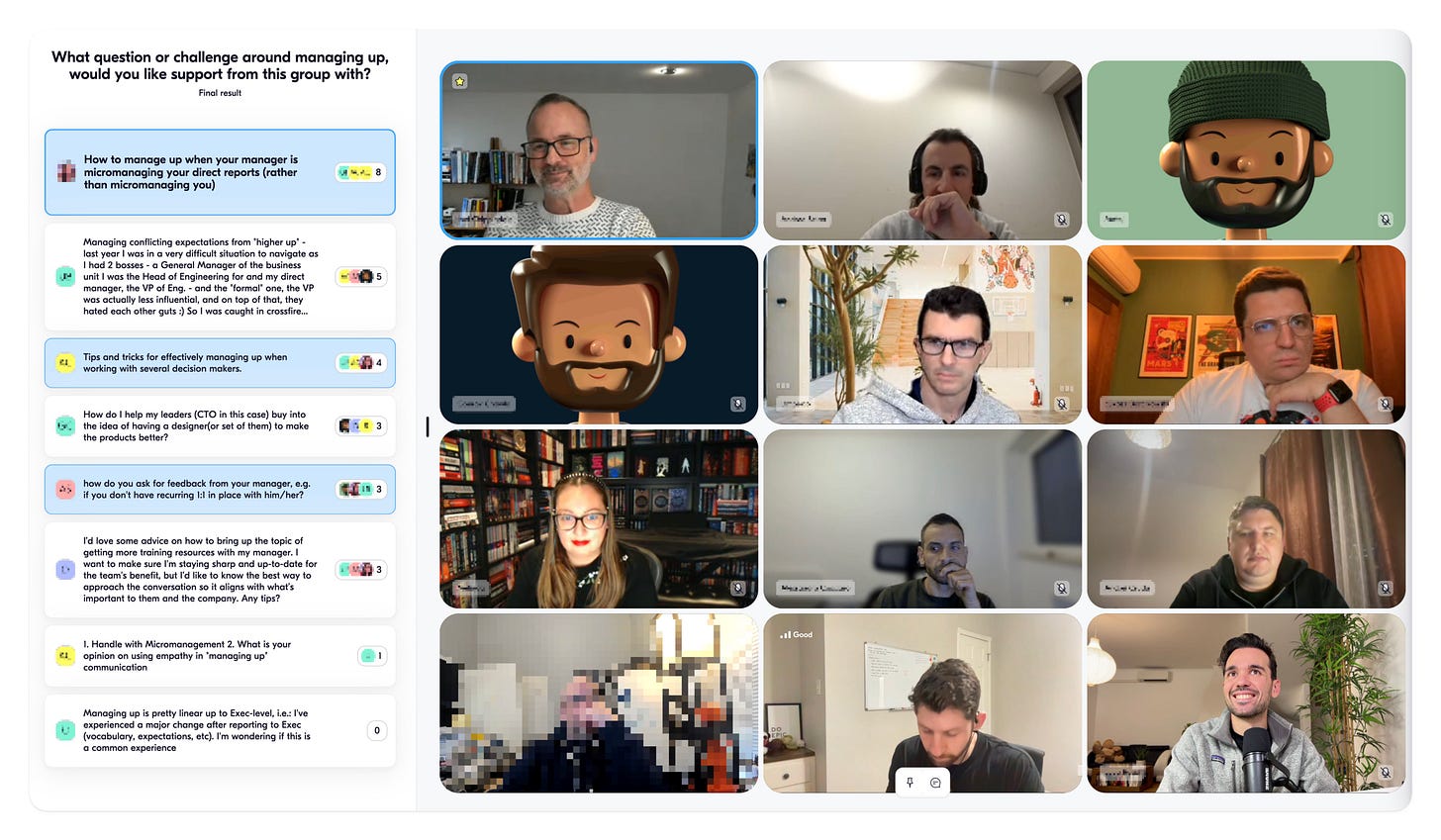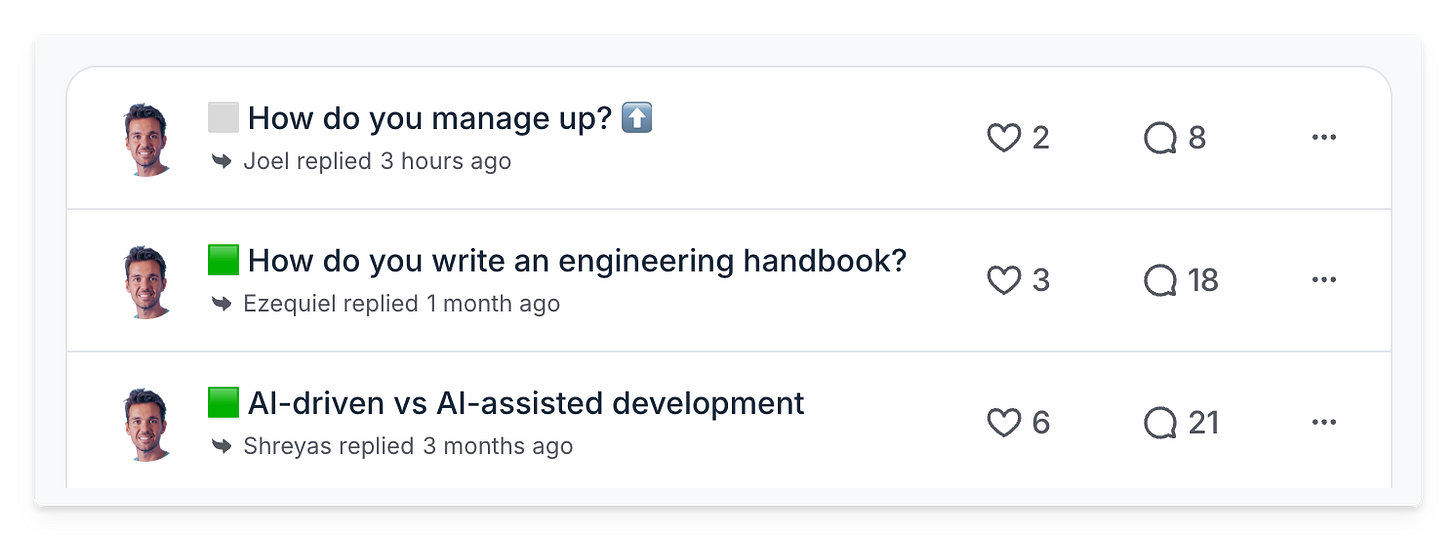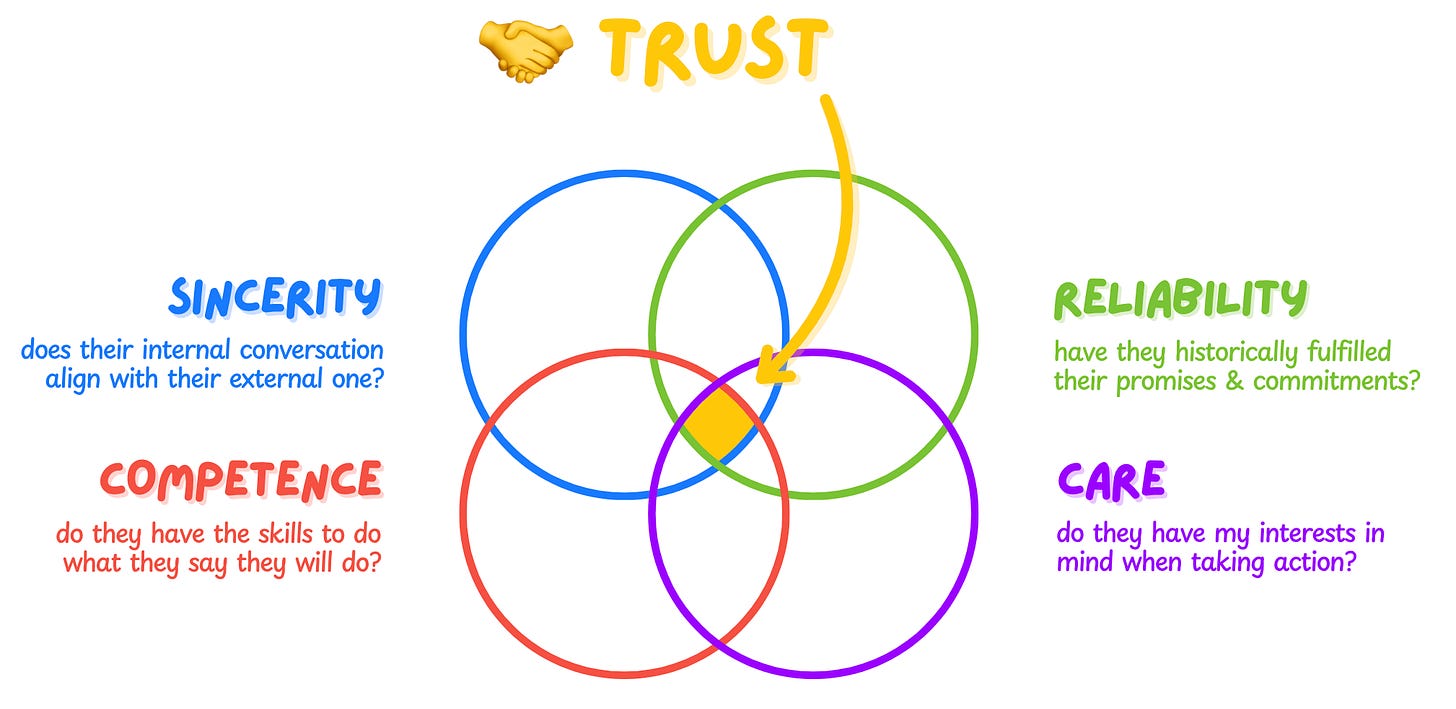Managing up ⬆️
How to create an awesome relationship with your manager.
There is a famous saying that goes: people don’t leave companies, they leave their managers. Little autonomy, dubious trust, less than exciting tasks — we have all been there.
The opposite is also true: great careers are enabled by great managers, or more precisely, by great relationships with your managers.
The way you intentionally take care of these relationships is called managing up.
Last month we held a mastermind session in the community about it, and the amount of challenges, stories, and wisdom shared by members was just incredible.

Later, we continued the chat in our coming up space, where I anticipate upcoming Refactoring articles to collect more insights and ideas 👇
The result is ~20 seasoned tech leaders sharing real-world stories and lessons learned about managing up, which today I will try to weave into a practical framework.
The main takeaway, which I can anticipate, is that good managing up is not — contrary to popular online advice — about tactics, manipulation, or “managing your manager”. It is about building a mutual understanding that enables both parties to succeed.
It is a very human challenge, and a universal one, regardless of your role or experience level. Whether you are a senior engineer, a CTO, or an intern, you will face similar situations in dealing with your higher-ups, which makes this topic even more important.
So here is the agenda for today:
🤝 Building trust — the four domains of trust and how to develop them.
🗣️ Speaking their language — adapting communication to different roles.
📊 Creating effective updates — from daily habits to weekly reports.
📚 Tools & resources — recommended books and frameworks from the community
Let’s dive in!
🤝 Building Trust
Managing up starts, and ends, with trust. But what does trust really mean in a professional context?
In The Thin Book of Trust, Charles Feltman breaks it down into four domains:
🎭 Sincerity — you are honest and transparent, even when it’s uncomfortable. This includes admitting mistakes early, being upfront with challenges, and sharing both good and bad news, without sugar-coating the latter.
⏰ Reliability — this is about consistency and following through. You do what you say you'll do, you set realistic expectations, and communicate proactively through regular update habits. More on this later in the updates section.
❤️ Care — you have their best interests in mind. This means understanding their goals and challenges, being proactive in helping them succeed, and showing empathy when things get tough.
🎓 Competence — finally, you deliver results. This goes beyond technical skills: it's about delivering business value, learning and growing from feedback, and understanding the big picture.
So, I like this framework because it is extremely simple and it gives you concrete areas to work on. You can ask yourself: how am I doing in each of these? How can I do better?
Still, trust alone is not enough 👇
🗣️ Speaking their language
The domains of trust mentioned above are personal qualities. While they are foundational for a healthy relationship, they may also not be enough for a productive one.
When you look at issues that arise between engineers and managers, like conflicts on estimates, tech debt, or planning, these often happen to people who are, in fact, reliable, competent, caring, and sincere.
So you may be all of the above, but ultimately fail to understand each other. This happens easily, as different stakeholders have (legitimately) different goals, care about different things, and tend to speak different languages.
When this is not addressed intentionally, parties make all kinds of assumptions about each other, which ultimately leads to misunderstanding and conflict.
The key aspect of managing up is to learn to speak the language of your counterpart. If you can speak their language you can understand their goals and fears, and you can communicate at the level they are. You'll be in a better position to be an effective report.
— Umberto Nicoletti, Head of R&D at Proemion
To bridge this gap, I find it useful to think in three steps: 1) map context, 2) translate impact, and 3) create agreements.
Let's explore them:
1) Map their context 🗺️
Different roles see the world—and the organization—through different lenses.
This is obvious to understand for roles that are very removed from our own—e.g. a CFO who sees everything through unit economics and cash flow—but it is also true for closer ones, like engineering managers vs tech leads, or EMs vs software engineers.
In these cases, the shift in perspective is more sneaky. As an engineer, you may care about your own developer experience, while your manager cares about team productivity. You may think in terms of architecture improvements, while your PM thinks in terms of product enablement. Are these related? Very closely. Are they the same thing? Not exactly.
Quoting our coach-in-residence Joel:
The better we understand the goals that our managers have, the less surprising their actions will be. […] Some of the situations where managers act in ways that most dismay or surprise us are when they are acting on their fears and worries.
Understanding your manager’s context and priorities boils down to asking two questions:
➡️ What makes you successful? — What are your goals and concerns?
⬅️ What makes me successful? — How can I help you reach your goals?
The only way for you to be successful is to make your manager successful. To do that, you need to be able to map your goals and concerns into their own 👇




